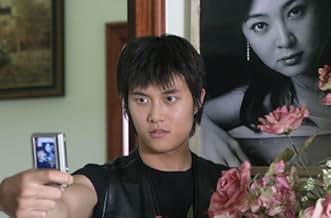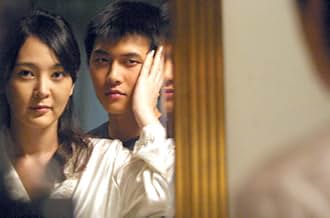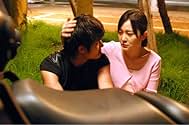IMDb रेटिंग
7.9/10
60 हज़ार
आपकी रेटिंग
एक अस्थायी युवा कुछ दिनों के लिए छुट्टियां मनाने गए लोगों के खाली घरों में रहता है. हालांकि एक दिन वह एक ऐसा घर में प्रवेश करता है जहां एक गृहिणी को उसकी मदद की जरूरत है.एक अस्थायी युवा कुछ दिनों के लिए छुट्टियां मनाने गए लोगों के खाली घरों में रहता है. हालांकि एक दिन वह एक ऐसा घर में प्रवेश करता है जहां एक गृहिणी को उसकी मदद की जरूरत है.एक अस्थायी युवा कुछ दिनों के लिए छुट्टियां मनाने गए लोगों के खाली घरों में रहता है. हालांकि एक दिन वह एक ऐसा घर में प्रवेश करता है जहां एक गृहिणी को उसकी मदद की जरूरत है.
- पुरस्कार
- 17 जीत और कुल 11 नामांकन
Joo-seok Lee
- Son of Old Man
- (as Ju-seok Lee)
Jang Jae-yong
- Hyun-soo
- (as Jae-yong Jang)
Park Se-jin
- Woman in Studio
- (as Se-jin Park)
Kang Sung-hoon
- Boyfriend of Girl who Got Hit by Golf Ball
- (as Seong-hun Kang)
फ़ीचर्ड समीक्षाएं
Originality is a rare commodity at any time, but it is in abundance in Kim ki-Duk's 3-IRON. The title refers to a golf club that is used to drive a ball long distances. In this case, the balls are, ultimately, driven into people with painful results.
A drifter who lives in temporarily vacated houses and apartments repays the owners by repairing appliances and watering plants. He meets a sad, abused woman and a non-verbal connection grows.
The magic is in the detail and the extraordinary cinematic clarity of Kim's style. There is the explosive violence that characterized his early films, but this entry is primarily an engaging character study with an existential bent.
What's truly original is the director's adherence to the way he presents his material. The style is consistent throughout and dialogue is mostly superfluous.
This has more in common with SPRING, SUMMER, FALL, WINTER...THEN SPRING AGAIN than THE ISLE, ADDRESS UNKNOWN or BAD GUY. Though I enjoyed the material, any subtler and Kim might begin to lose the edge that distinguishes him.
Tonally, the film reminded me of aspects of OLD BOY.
A drifter who lives in temporarily vacated houses and apartments repays the owners by repairing appliances and watering plants. He meets a sad, abused woman and a non-verbal connection grows.
The magic is in the detail and the extraordinary cinematic clarity of Kim's style. There is the explosive violence that characterized his early films, but this entry is primarily an engaging character study with an existential bent.
What's truly original is the director's adherence to the way he presents his material. The style is consistent throughout and dialogue is mostly superfluous.
This has more in common with SPRING, SUMMER, FALL, WINTER...THEN SPRING AGAIN than THE ISLE, ADDRESS UNKNOWN or BAD GUY. Though I enjoyed the material, any subtler and Kim might begin to lose the edge that distinguishes him.
Tonally, the film reminded me of aspects of OLD BOY.
It's hard to mark this movie because it's hard to put it into a category. It is romance, social satire and drama in the same time. This guy breaks into houses and lives inside them like they were his own, while the owners are gone, without actually stealing anything. I don't want to spoil the ending, but I think this is the main pillar of the movie, the idea that one can succeed on living in the world, but out of sight. This is a movie for the true pariah, the one that wants to be left alone, in silence, in his own world.
It is said that the best warrior wins the battles without fighting. If that's true, then Kim Ki-Duk is amongst the best dialog writers ever :) The characters say nothing, but tell a lot.
I think it is a movie worth watching, it's quiet and has some original ideas that can catch your imagination if in the right mood.
It is said that the best warrior wins the battles without fighting. If that's true, then Kim Ki-Duk is amongst the best dialog writers ever :) The characters say nothing, but tell a lot.
I think it is a movie worth watching, it's quiet and has some original ideas that can catch your imagination if in the right mood.
Ki-duk Kim has written and directed an outstanding film about a homeless, but creative individual who breaks into houses for a place to eat, sleep, and clean himself up. While there, he fixes anything that is broken, does the laundry, and makes sure he cleans up after himself.
He breaks into a house that he thinks is empty and finds an abused woman. What transpires is one of the most tender and beautiful films I have ever seen. I would not spoil it by revealing any of the plot as this is one you definitely have to see.
If Ki-duk Kim can write a love story this incredible, I certainly want to see his action films.
He breaks into a house that he thinks is empty and finds an abused woman. What transpires is one of the most tender and beautiful films I have ever seen. I would not spoil it by revealing any of the plot as this is one you definitely have to see.
If Ki-duk Kim can write a love story this incredible, I certainly want to see his action films.
The Korean film "3-Iron" has an extraordinary story - not the content 'Per Se' but its treatment, approach and delivery by producer-writer-director-editor Kim Ki-Duk. There are many quiet, speechless moments and scenes, yet they spoke volumes - almost the feel of Zen, meaningfully so. It's beyond what the society or people 'traditionally' may see or assume. Yes, there may be 'turn off's' and disapproving situations - can we, do we, have the heart to forgive? Are we so 'sacred' and impeccable without ever making mistakes in our lives? Yes, we may not be so bold and brash as to 'crash' into another man's house - yet the thought of the young man's 'reality' of being so simple 'matter of fact' walking into someone else's home is not so improbable? He actually appears to be a thoughtful person. He handles with care the content of the house. He picks up the clothes lying around the place, gathers them, hand-washes them, hangs them up, cleans up the place, literally enjoys the home environment (the bath, the kitchen, the food, the bed, etc.) The observant dilemma being he obviously appreciates the house/home more than the owners/occupants.
There is 'suspense' - we'd worry what will happen to him, to him and her, and as the worse fear may arise (just like any cops and robbers film), can true justice prevail after all? Just when you think you figured out what's going on, w-d Kim gives us something more to think about. Elements that we don't expect - we're in awe at the concept and perspective presented to us, the viewer. It's quite extraordinary, really. And be afraid not, it will be rewarding, satisfying somehow, and you just might savor that last moment of magic between the two lead characters, her and him. The strength of the two leads portraying to perfection at sublimated tempo by Lee Seung-Yeon (as Sun-Hwa the woman) and Jae Hee (as Tae-Suk the man) is truly a godsend (both in their debut performances).
Once again, bravo to Sony Pictures Classics for the choice distribution of this film. Check out the Official Site for Director's Statement and a detail synopsis (best to do this after seeing the film.) "Spring, Summer, Autumn, Winter and Spring" (2003) is another film by w-d Kim, exquisite in cinematic visual and integral in storyline experience. (For non-golfers, the title "3-Iron" refers to golf club.)
There is 'suspense' - we'd worry what will happen to him, to him and her, and as the worse fear may arise (just like any cops and robbers film), can true justice prevail after all? Just when you think you figured out what's going on, w-d Kim gives us something more to think about. Elements that we don't expect - we're in awe at the concept and perspective presented to us, the viewer. It's quite extraordinary, really. And be afraid not, it will be rewarding, satisfying somehow, and you just might savor that last moment of magic between the two lead characters, her and him. The strength of the two leads portraying to perfection at sublimated tempo by Lee Seung-Yeon (as Sun-Hwa the woman) and Jae Hee (as Tae-Suk the man) is truly a godsend (both in their debut performances).
Once again, bravo to Sony Pictures Classics for the choice distribution of this film. Check out the Official Site for Director's Statement and a detail synopsis (best to do this after seeing the film.) "Spring, Summer, Autumn, Winter and Spring" (2003) is another film by w-d Kim, exquisite in cinematic visual and integral in storyline experience. (For non-golfers, the title "3-Iron" refers to golf club.)
10desh79
Kim Ki-Duk's films portray a black world view, one by which our selfish impulses cause us to destroy each other and, ultimately, ourselves. They are driven by the central character's desire to escape this world, in their own ways eventually finding a way out of the reality that engulfs them. In Real Fiction (2000), the protagonist disappears into a day dream in which he has revenge on all those who wronged him in the past; in Spring Summer Autumn Winter... And Spring (2003), a Buddhist monk lives, literally, on an island separated from the rest of the world; any contact with the outside world results in tragedy, be it a visiting mother fleeing with her child (she drowns, though the child, gratefully, survives), or the monk's apprentice running off with a girl (he ends up murdering her and is wanted by the police); in Bad Guy, the eponymous protagonist tries to find solace through his own love fantasy; and then there is 3 Iron, Kim Ki-Duk's magnum opus and one of the most remarkable films ever made.
3 Iron seems to tie all the visual and thematic aspects of Kim's films together, neatly and impressively, making it the "ultimate" Kim Ki-Duk film, much the same way Fitzcarraldo is the "ultimate" Herzog- or North By Northwest was the "ultimate" Hitchcock film. Like every Kim Ki-Duk film, the protagonist is a rank outsider from mainstream society. Like Bad Guy, the character plays his part almost entirely mute (and on this note, both Jo Jae-hyeon's and Lee Hyun-kyoon's performances have to be utterly applauded for being both wonderfully subtle and yet so forcefully expressive). Once again, we are faced with a latent dual reality, where the protagonist escapes the world around him, but is also brutally dragged back into it. Like Bad Guy, 3 Iron is a strange love story, albeit a far more assuasive one, where both the characters decide to disappear into "their own world".
However, 3 Iron defies explanation. Can you imagine trying to pitch this to a Hollywood producer? "Ok, there's this guy and he, like, breaks into people's houses. He washes their clothes, dishes, bathrooms -.. he even wears their clothes, sleeps in their beds, and repairs stuff for them, like clocks or broken toy guns (with hilarious consequences in the latter's case!). One day he breaks into a house, thinking he's alone, but meets an abused wife. When her husband returns, he proceeds to attack the old philanderer in a very original way (which neatly ties in with the title of the film... you'll see) and she runs off with him. They then enter "his" world and live "his" life together, breaking into houses, etc, before they get dragged back into the real world with all the pain and suffering it brings". Yeah! That'll really get the 18-25 demographic rolling down the aisles! Chances are I would have been kicked out midway through the second sentence, though if I'm really honest I wouldn't actually mind trying to pitch this to Don Simpson, just to see the reaction on his face.
But it really would be doing this movie little justice to try and "summarise" it in some neat little way. It needs to be watched, it needs to be experienced, like all the great movies. There is no real "idea" in this film, necessarily, nor is there a big "statement" of sorts - Kim Ki-Duk is not a "statement" film-maker like Godard or Eisenstein. Rather, like Lynch, he prefers to make films that work on an instinctive level, in that they draw a gut emotional reaction from you that cannot necessarily be articulated or expressed in an intellectual manner. Is it any coincidence, then, that Kim, like Lynch, primarily hails from a painting background, and actually wanted to be a painter before he became a film-maker?
Paintings are an apt analogy, since every frame is clearly carefully and thoughtfully choreographed (characters are either separated (in both the physical and emotional sense) by vertical-, or they are united by horizontal lines). But putting aside any visual- and textual comparisons to Lynch, Kim Ki-Duk also draws a lot from Wong Kar Wai in terms of narrative, and anyone who has seen Chungking Express should notice comparisons to 3 Iron in that both concentrate on a character who breaks into someone else's house/flat and lives their life without them noticing, or how one song is ceaselessly repeated to emphasise both the love between the two central characters and, furthermore, the characters' wish to escape reality (though 3 Iron does so more on a less literal level, as I mentioned before) - in Chungking Express, it was California Dreamin' (a song that will never be the same for me after that film, and I suspect a lot of people feel this way), while in 3 Iron it's "Gafsa" by Natasha Atlas.
Still, I suppose I can conceptualise and intellectualise to my heart's content - somehow I doubt that any of this will spur you to watch this movie. But I think it should. This film deserves to be seen. It's a tender, thought-provoking, and ultimately (and quite strangely) heart-warming film, as well as, quite possibly. an indication that Kim Ki-Duk is slowly coming of an age as a film-maker, moving on from an entirely pessimistic worldview to one that is more reassuring and serene. Yes, there is suffering and darkness, but there is also hope, and I think, this, ultimately is what 3 Iron is trying to tell us. It is, in short, utterly required viewing, not to mention the work of a true genius. And it's really not very often I bandy this word about.
3 Iron seems to tie all the visual and thematic aspects of Kim's films together, neatly and impressively, making it the "ultimate" Kim Ki-Duk film, much the same way Fitzcarraldo is the "ultimate" Herzog- or North By Northwest was the "ultimate" Hitchcock film. Like every Kim Ki-Duk film, the protagonist is a rank outsider from mainstream society. Like Bad Guy, the character plays his part almost entirely mute (and on this note, both Jo Jae-hyeon's and Lee Hyun-kyoon's performances have to be utterly applauded for being both wonderfully subtle and yet so forcefully expressive). Once again, we are faced with a latent dual reality, where the protagonist escapes the world around him, but is also brutally dragged back into it. Like Bad Guy, 3 Iron is a strange love story, albeit a far more assuasive one, where both the characters decide to disappear into "their own world".
However, 3 Iron defies explanation. Can you imagine trying to pitch this to a Hollywood producer? "Ok, there's this guy and he, like, breaks into people's houses. He washes their clothes, dishes, bathrooms -.. he even wears their clothes, sleeps in their beds, and repairs stuff for them, like clocks or broken toy guns (with hilarious consequences in the latter's case!). One day he breaks into a house, thinking he's alone, but meets an abused wife. When her husband returns, he proceeds to attack the old philanderer in a very original way (which neatly ties in with the title of the film... you'll see) and she runs off with him. They then enter "his" world and live "his" life together, breaking into houses, etc, before they get dragged back into the real world with all the pain and suffering it brings". Yeah! That'll really get the 18-25 demographic rolling down the aisles! Chances are I would have been kicked out midway through the second sentence, though if I'm really honest I wouldn't actually mind trying to pitch this to Don Simpson, just to see the reaction on his face.
But it really would be doing this movie little justice to try and "summarise" it in some neat little way. It needs to be watched, it needs to be experienced, like all the great movies. There is no real "idea" in this film, necessarily, nor is there a big "statement" of sorts - Kim Ki-Duk is not a "statement" film-maker like Godard or Eisenstein. Rather, like Lynch, he prefers to make films that work on an instinctive level, in that they draw a gut emotional reaction from you that cannot necessarily be articulated or expressed in an intellectual manner. Is it any coincidence, then, that Kim, like Lynch, primarily hails from a painting background, and actually wanted to be a painter before he became a film-maker?
Paintings are an apt analogy, since every frame is clearly carefully and thoughtfully choreographed (characters are either separated (in both the physical and emotional sense) by vertical-, or they are united by horizontal lines). But putting aside any visual- and textual comparisons to Lynch, Kim Ki-Duk also draws a lot from Wong Kar Wai in terms of narrative, and anyone who has seen Chungking Express should notice comparisons to 3 Iron in that both concentrate on a character who breaks into someone else's house/flat and lives their life without them noticing, or how one song is ceaselessly repeated to emphasise both the love between the two central characters and, furthermore, the characters' wish to escape reality (though 3 Iron does so more on a less literal level, as I mentioned before) - in Chungking Express, it was California Dreamin' (a song that will never be the same for me after that film, and I suspect a lot of people feel this way), while in 3 Iron it's "Gafsa" by Natasha Atlas.
Still, I suppose I can conceptualise and intellectualise to my heart's content - somehow I doubt that any of this will spur you to watch this movie. But I think it should. This film deserves to be seen. It's a tender, thought-provoking, and ultimately (and quite strangely) heart-warming film, as well as, quite possibly. an indication that Kim Ki-Duk is slowly coming of an age as a film-maker, moving on from an entirely pessimistic worldview to one that is more reassuring and serene. Yes, there is suffering and darkness, but there is also hope, and I think, this, ultimately is what 3 Iron is trying to tell us. It is, in short, utterly required viewing, not to mention the work of a true genius. And it's really not very often I bandy this word about.
क्या आपको पता है
- ट्रिवियाDirector Kim ki-Duk wrote the screenplay of the movie in one month, the movie was filmed in 16 days and the film editing was done in 10 days.
- गूफ़His boxer-type BMW motorcycle, which has two cylinders, is dubbed with the sound of a four cylinder engine.
- क्रेज़ी क्रेडिटA quote showing before the end credits: "It's hard to tell that the world we live in is either a reality or a dream."
- कनेक्शनFeatured in Smagsdommerne: एपिसोड #2.15 (2005)
टॉप पसंद
रेटिंग देने के लिए साइन-इन करें और वैयक्तिकृत सुझावों के लिए वॉचलिस्ट करें
- How long is 3-Iron?Alexa द्वारा संचालित
विवरण
- रिलीज़ की तारीख़
- कंट्री ऑफ़ ओरिजिन
- आधिकारिक साइट
- भाषा
- इस रूप में भी जाना जाता है
- Bin-jip
- फ़िल्माने की जगहें
- उत्पादन कंपनियां
- IMDbPro पर और कंपनी क्रेडिट देखें
बॉक्स ऑफ़िस
- बजट
- $10,00,000(अनुमानित)
- US और कनाडा में सकल
- $2,41,914
- US और कनाडा में पहले सप्ताह में कुल कमाई
- $20,084
- 1 मई 2005
- दुनिया भर में सकल
- $34,03,957
- चलने की अवधि
- 1 घं 28 मि(88 min)
- रंग
- ध्वनि मिश्रण
- पक्ष अनुपात
- 1.85 : 1
इस पेज में योगदान दें
किसी बदलाव का सुझाव दें या अनुपलब्ध कॉन्टेंट जोड़ें






















